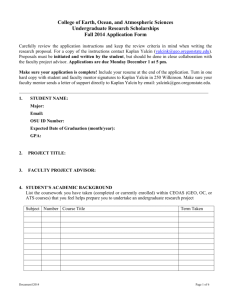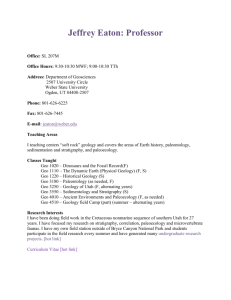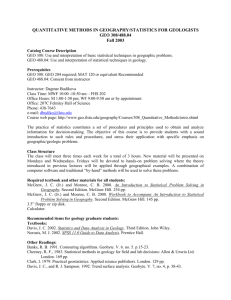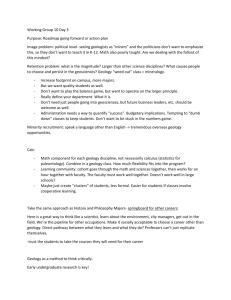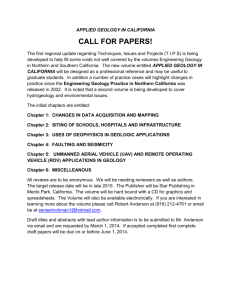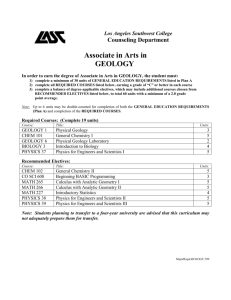Earth Sciences Geology Option - College of Earth, Ocean, and
advertisement
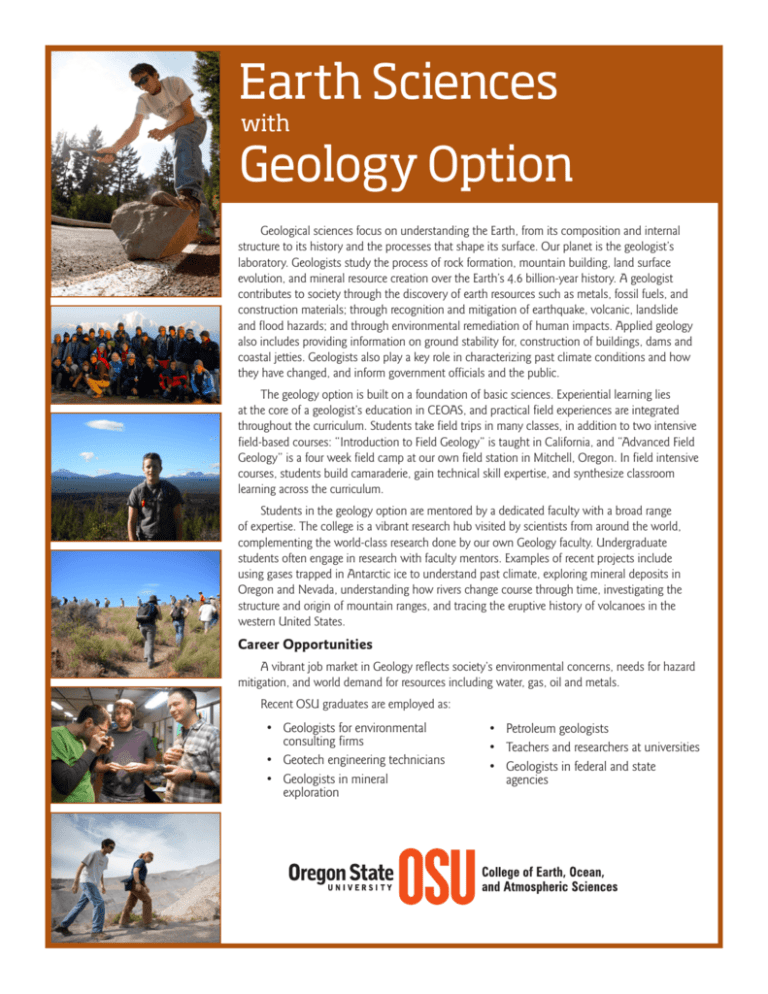
Earth Sciences with Geology Option Geological sciences focus on understanding the Earth, from its composition and internal structure to its history and the processes that shape its surface. Our planet is the geologist’s laboratory. Geologists study the process of rock formation, mountain building, land surface evolution, and mineral resource creation over the Earth’s 4.6 billion-year history. A geologist contributes to society through the discovery of earth resources such as metals, fossil fuels, and construction materials; through recognition and mitigation of earthquake, volcanic, landslide and flood hazards; and through environmental remediation of human impacts. Applied geology also includes providing information on ground stability for, construction of buildings, dams and coastal jetties. Geologists also play a key role in characterizing past climate conditions and how they have changed, and inform government officials and the public. The geology option is built on a foundation of basic sciences. Experiential learning lies at the core of a geologist’s education in CEOAS, and practical field experiences are integrated throughout the curriculum. Students take field trips in many classes, in addition to two intensive field-based courses: “Introduction to Field Geology” is taught in California, and “Advanced Field Geology” is a four week field camp at our own field station in Mitchell, Oregon. In field intensive courses, students build camaraderie, gain technical skill expertise, and synthesize classroom learning across the curriculum. Students in the geology option are mentored by a dedicated faculty with a broad range of expertise. The college is a vibrant research hub visited by scientists from around the world, complementing the world-class research done by our own Geology faculty. Undergraduate students often engage in research with faculty mentors. Examples of recent projects include using gases trapped in Antarctic ice to understand past climate, exploring mineral deposits in Oregon and Nevada, understanding how rivers change course through time, investigating the structure and origin of mountain ranges, and tracing the eruptive history of volcanoes in the western United States. Career Opportunities A vibrant job market in Geology reflects society’s environmental concerns, needs for hazard mitigation, and world demand for resources including water, gas, oil and metals. Recent OSU graduates are employed as: • Geologists for environmental consulting firms • Geotech engineering technicians • Geologists in mineral exploration • Petroleum geologists • Teachers and researchers at universities • Geologists in federal and state agencies Earth Sciences with Geology Option What to know about Oregon State University Student Services & Advising College of Earth, Ocean, and Atmospheric Sciences 102-104 Wilkinson Hall 541-737-1201 OSU Admissions 104 Kerr Administration 541-737-4411 800-291-4192 OSU Financial Aid Student Employment Loans & Scholarships College Work Study 218 Kerr Administration 541-737-2241 OSU Registrar 102 Kerr Administration 541-737-4331 OSU Housing 102 Buxton Hall 541-737-4771 OSU Website http://oregonstate.edu OSU Extended Campus 4943 The Valley Library 800-667-1465 http://ecampus.oregonstate.edu For more information, please contact: College of Earth, Ocean, and Atmospheric Sciences Oregon State University 104 Wilkinson Hall Corvallis, Oregon 97331-5506 phone: 541-737-1201 fax: 541-737-1200 email: earth.sciences@oregonstate.edu web: http://ceoas.oregonstate.edu Course of Study The Earth Sciences major consists of foundational math and science courses, core Earth Sciences courses, and focused coursework in the option. A graduation checklist with complete requirements can be obtained from an advisor. Below you will see an example curriculum showing a course plan to complete the B.S. in Earth Sciences with a Geology option. In addition undergraduates at OSU must complete the Baccalaureate Core, consisting of Skills courses; Perspectives courses; a class in Difference, Power and Discrimination; two Synthesis courses; and a Writing Intensive Course. FreshmanCredits Physical GeologyGEO 2014 Earth Systems ScienceGEO 2024 Evolution of Planet EarthGEO 2034 Chemistry CH 231, CH 232, CH 233 15 MathMTH 1124 Baccalaureate Core and Electives14 SophomoreCredits Introduction to Field GeologyGEO 2953 Earth Materials I: MineralogyGEO 3104 Earth Materials I: PetrologyGEO 3154 Earth Materials I: Igneous Petrography GEO 415 4 Intro to GISGEO 3654 OceanographyOC 2014 CalculusMTH 251, MTH 2528 Introduction to Statistical Methods ST 351 4 Baccalaureate Core and Electives10 JuniorCredits Surface ProcessesGEO 3224 Structural GeologyGEO 3404 Stratigraphy & SedimentologyGEO 3704 Geology Elective6 The Changing ClimateATS 3203 PhysicsPH 211, PH 2128 Baccalaureate Core and Electives16 SeniorCredits Advanced Field Geology (Summer) GEO 495 6 HydrogeologyGEO 4874 GeochemistryGEO 4304 Geophysics/TectonicsGEO 4634 Geology Elective6 Oregon State University is an Affirmative Action Contemporary Earth Science Issues GEO 409 3 Equal Opportunity Employer and complies with Baccalaureate Core and Electives18 Section 504 of the Rehabilitation Act of 1973.
